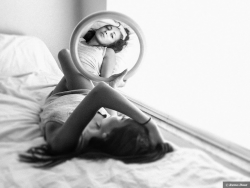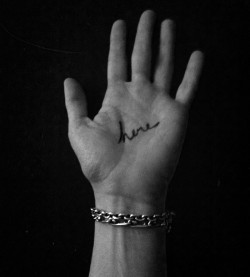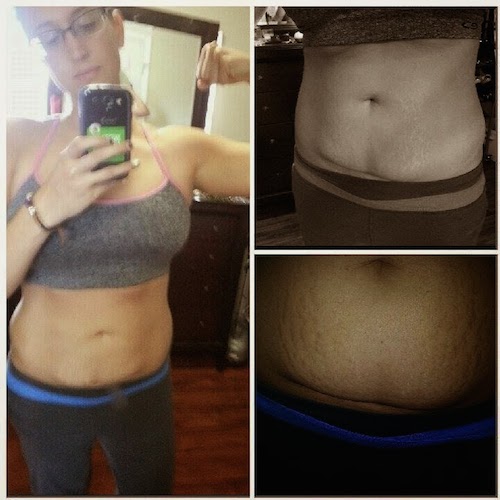I’m about to say a whole bunch of things you’re not supposed to say out loud…and show you a picture of my stomach.
I watched The Sexy Lie: Caroline Heldman at TEDxYouth@SanDiego. In this TEDx talk, Dr. Caroline Heldman talks about what sexual objectification is and why it’s not empowering. She holds my attention as she talks about some pretty obvious ways that our culture objectifies (mainly) women—96 percent of sexually objectified images are women—and that it’s bad for us, but as interested as I am in her views, for the first few minutes I’m mostly thinking, duh.
I have no idea, however, that she is about to completely wreck my day (or my week, or maybe the rest of my forever).
When she highlights the absurdity in the assertion that it’s okay to use sexuality in advertising because “sex sells” by logically arguing that, if that is the case, ads targeted towards straight women would likely feature more scantily clad men, I laugh along with the audience. But she isn’t telling me something I didn’t know (also see HBO Should Show Dongs).
In men’s magazines and advertising, we see pictures of sexy women; in women’s magazines and advertising, we see…pictures of sexy women?
Because, of course. She argues that we’re not being sold products as much as we are being sold ideas. She says men are being sold the idea that they have all the power and that their bodies are tools to get the job done.
The process of my undoing starts at 5:43 when she says, “We [women] are being sold the idea that this [becoming the perfect sexual object] is where we get our value.” This sexual objectification becomes self-objectification.
She later posits that we raise little girls (you know, those things we were once) to “view their bodies as projects to be worked on.”
Let that sink in, because it’s true.
Now it’s time for me to come clean.
Sometimes I am seriously judgmental.
I know within a few seconds of her starting that no matter where she goes with it, she’s going to wrap this talk up with a plea to start valuing women for their minds, their personalities, their skills, and abilities—but anytime a woman says something like, “Beauty comes from the Inside,” or “Love your body,” or “Every Body is beautiful,” (and it’s almost always women saying those things) I immediately judge her and the validity of her statement based on a few key factors.
What I don’t do is actually consider that these are really true statements that can be acted upon. I just don’t. I usually write this kind of thing off as a platitude, or, at best, reblog it on my Facebook wall and forget it. I certainly don’t believe it and I certainly don’t internalize it.
Here’s what I actually do: If she’s prettier than I think I am or has a nicer body than I think I do, my first thought is, that’s easy for her to say. If she’s “on par” with where I feel I am on the looks-ladder, or less attractive than I think I am, I probably think, who’s she trying to convince? or, she’s just making excuses, if she worked harder at the gym/ate better/ etc. she could look better, or, frankly, bullshit.
Right about the time I’m about to shut this video off and chalk it up to platitudinous drabble, Dr. Heldman talks about exactly that! (Because, apparently, she’s inside my mind.)
At 8:47 she talks about how we “compete with each other for our own self-esteem,” as if there’s a limited and finite amount of self-esteem in the world. That we walk into a party and immediately decide where we are in the “pretty girl pecking order” and it makes us feel worse about ourselves.
I do that. I totally do that!
Yep. That’s right. I size other women up based on how I’ve already sized myself up and then I decide whether to feel better or worse about myself. It’s usually the first thing I do when I enter any new space. If you’re female and we’ve met, I’ve sized you up. If you’ve ever been in line with me at Target or been eating in the same restaurant as I am, or even just crossed my line of sight, I’ve judged you, or, really, I’ve judged myself against you. If I decide you’re prettier than I am, then I start hoping you’re mean or dumb or have some other obvious flaw so that I can feel better about myself.
It’s always hardest for me to meet someone who is good looking, kind, and intelligent, so what do I do then? I have to make you my friend, of course; keep your friends close and all that. (Don’t want to be friends with me? Well of course that’s because you’re a hateful bitch, and not at all because I may or may not have been silently sending out Judgey McInsecurity vibes that make you uncomfortable in a way that you just can’t put your finger on.)
I’m always, all the time, obsessively judging myself.
I’m sitting alone in my house right now and I’ve readjusted the rolls on my stomach in my jeans about six dozen times in the last 45 minutes. Dr. Psychic, I mean, Heldman talks about that, too! (See what I mean by “wrecked” the rest of my forever?)
At 6:27 she starts to outline the Effects of Self- Objectification and at 6:40 she talks about “Habitual Body Monitoring.” Habitual Body Monitoring is that thing people do where they mentally assess and adjust—how does the lighting fall, how’s my hair, pull my jeans up, shift my weight, don’t look from that angle, etc.
 She says (and there’s science to back this up) that women do this once every 30 seconds. I totally believe it. I’m doing it right now. She said we do it so often that it interferes with our cognitive functioning!
She says (and there’s science to back this up) that women do this once every 30 seconds. I totally believe it. I’m doing it right now. She said we do it so often that it interferes with our cognitive functioning!
We are basically wasting so much mental energy freaking out about our muffin tops that it’s actually making us dumber.
I try to mitigate how often I think I might end up Habitual Body Monitoring on the front-end of my day by always wearing the most flattering thing possible. To accomplish this I will change my clothes quite literally as many as ten or 12 times before either being satisfied or just giving up, putting on yoga pants, and calling the day a wash.
I recently had a very young and beautiful friend visiting. She watched me go through this process and she commented something like, “Oh, you’re such a girl.” And I (derisively) said (snorted), “What, like you don’t do this?!” She (very nicely and matter-of-factly) said, “No, I just put on what I’m going to wear and be done with it.”
I replied (shot at her), “Must be nice to have such a great body that everything you put on looks good, not all of us are that lucky,” and, for just a few seconds, I hated her. I hated her because I was so full of envy towards her youth and her perfect c-section-less body and well-rested eyes and glowing skin and I felt like she was rubbing it in. She wasn’t, of course. She’s one of my best friends and had no idea that she was hitting a nerve. She did nothing wrong.
I’ll tell you another truth, I almost never judge in favor of myself. Just like with my friend. I sized her up, sized us both up, and I came up way short. It’s an unwinnable contest, of course, because even when I’m the only person competing, I still manage to lose.
I’m like my own personal Simon Cowell.
And it doesn’t just affect my friendships. It’s totally destroying my sex life. More often than not, I waste what few moments my husband and I have to ourselves (we’re parents, remember) drenched in stress because I can’t get out of my head and into my body. I’m worried about my stomach or my cellulite, my hair, or the way my eye crosses a little when I take my glasses off.
Dr. Heldman talks about that too! (Spooky!) She calls it “Spectatoring.” She says one of the bad effects of self-objectification is diminished sexual satisfaction, because instead of staying fully present in their bodies, in the moment, women become obsessed with “getting it right,” and it’s as though we are watching ourselves from the outside criticizing every imperfection. And it’s keeping us from having satisfying (let alone radically intimate and rewarding) sex lives.
The constant struggle to lose weight makes it worse, too. When I physically push myself—really, really hard—make it to the gym two hours a day and five to seven days a week, count literally every calorie, I tend to be able to lose about 10-15 pounds. I’m not happier, of course, because every waking moment is spent calculating and scrutinizing and weighing.
When I do get down that 10 or 15 pounds, I may like the way I look better but the stress to maintain it exhausts me. Then my life happens to me and I “fall off the gym wagon” and I end up right back at the weight I’m at now. The number that’s on my scale now is (give or take five pounds) the number I’ve been at for almost all of my adult life (not including the tail end of my pregnancies), so why can’t I just be okay with it?
And there it is: the heart of the whole thing.
Most of my energy is spent consumed with this hate. I hate my body. I do. And I hate myself for hating myself. So I spend all my time trying to fix myself or fix my self-image or get my mind off it entirely (did someone say cookies??) and I’m missing out on my life. I feel totally stuck in this hopeless hate-storm that I just can’t force my way out of.
I started writing this piece in the morning. I watched the video and I was flooded with emotion and just had to get it out. As is the way with most moms, though, I had to put it down and come back to it several times. In hindsight, I’m glad. Every time I’ve walked away and returned to this piece something powerful happened in the space in between.
The first time I left for a doctor’s appointment I didn’t really have. I had somehow mixed up the date. At that time, though, I was able to calm down.
My first reaction was an almost angry one. I know that I judge others because I’m so full of judgment for myself. Coming at this from a place of judgment and hate was causing a desperate, sad, emotional reaction in me and I was simultaneously involved in actively plotting how I could rearrange my schedule and our pantry to drop a few more pounds and hating myself for not being able to just “let it go.” Walking away for a bit, taking some deep breaths, allowed me to replay it over in my mind and I started to drop some of the emotional charge and see all of this for what it really was.
The second time I had to put this down was to take my son to an appointment. As I waited in the lobby I was reading the only book I had with me, “40 Days to your Personal Revolution” by Baron Baptiste. The piece of the book I just happened to land on hit the heart of my issue like a laser.
I’m reading through the laws of transformation and as I finished Law 6: Drop What You Know, I turned to Law 7: Relax with What Is—and here, in this space, Baron says, “At any given moment, the compassionate, frictionless flow of the universe wants to help us, if we will only allow it.”
This is the yoga of my body hatred:
Feelings are just that…Feelings.
Just because you feel something, doesn’t make it true, and it doesn’t mean you have to act on that feeling. Yoga teaches us to create space. One of the most powerful things that happens in that space is that you see the distance between situations and your response to them. You become a thoughtful responder instead of an emotional reactor. I might feel like my body is awful and worthless, or that the worth of my body lies in its shape and size, but feeling that way doesn’t make it true.
Drop what You Know.
Dr. Heldman says we are so inundated with sexual objectification that acknowledging it would be like someone living his whole life in a red room and then being asked to describe the color red.
I have been raised in a world where this skewed image of my body and its worth is totally normal. Now I look at my daughter and I’m terrified at the example that’s being set for her. I can continue to build stories around bad information, or I can drop what I used to “know” and embrace truth.
Baptiste says, “When you stop thinking, you can come out of your head and become fully present in your body. It means noticing your doubts and letting them go, endlessly releasing the thoughts and internal stories that reinforce your mental status quo. By letting go of your storyline, you open the lines of communication between you and your higher power.”
Stay fully present.
Get out of your head, out of the stories you’ve wrapped yourself up in, and stay present. In the physical practice of yoga, it’s important to stay present in your breath and your body so that you keep alignment and stay safe. You also end up being able to more fully express each pose when you’re not forcing it. It’s the same when it comes to loving your body. If you’re spending all your time worrying and adjusting and Habitually Monitoring your Body you will miss out on the experience of just living.
Honor your body.
Yoga teaches us to communicate with our bodies and honor what they’re saying to us. Your head may tell yourself you’re not strong enough, but your body knows the truth—you are stronger than you give yourself credit for. Your head may tell you to push and push and push but if your body is telling you to back off, listen to it or you’ll hurt yourself.
Your body is not an object built to sell a product, or a thing that only has value when it can provide pleasure to someone else. Your body is a beautiful, magical tool that can take you to amazing places and enable you to do amazing things. (The doctor talks about all that, too.)

When I sat still yesterday, in the space between writing sessions, I was able to check in with my own body and communicate. I feel like my body has no worth, but what’s the truth?
Body, are you healthy? Do you feel strong? Are you well-fed and well-nourished? Do you get enough rest? Do you have the energy to play with the kids and show up for my friends and engage with my husband? Arms, can you carry me through yoga practice? Can you pick up my kids when they fall down? Can you hold my husband when he’s had a hard day or when he wants to connect? Legs, can you stay strong in Trikonasana? Can you chase the boy around the back yard? Hips, can you stay in Padmasana while I meditate? Can you stay grounded while we have tea party picnics on the girl’s bedroom floor?
My kids don’t care if my arms are chiseled, they care if they’re available for snuggles. My husband couldn’t care less how flat my stomach is(n’t), he’s always been attracted to me and loved me no matter what shape my belly takes. My friends don’t love me for my jeans size, they love me because I’m there for them when they need me. My students don’t want a yoga teacher with a thigh gap, they want a teacher who will show up for them in a big way and stay present.
Fake it ‘til you make it.
I may not love my body right now, and I may often feel that I am worthless because I feel that my body is worthless. But I know that my body is worthy of my love. And I know I am worthy of love. So instead of waiting to be happy on some future “what if” (like, ‘I’ll finally be happy if I could just lose xx pounds or fit into size x), I can practice being happy right now. I can speak positivity into my mind and heart. I can act like a beautiful, lovely person of value, even if I don’t always feel it.
Those things are what is true; my loathing is just a story.
It’s called yoga practice, not “yoga perfect.” Relax with what is.
There’s no such thing as a perfect asana. There’s safe. There’s unsafe. There’s drawing in to create your fullest expression out. There’s no such thing as perfect. You get on your mat and your practice. You constantly, consistently, endlessly, day after day, practice.
Baron says, “Staying in our body and not in our head is a constant practice.” That means it doesn’t end when you get off the mat. Your half pigeon doesn’t get to be perfect. Your parenting doesn’t get to be perfect. Your body doesn’t get to be perfect. My body doesn’t get to be perfect. Why? Because life just isn’t perfect.
That’s great news!!! It means you do the best you can every day (which changes every day) and then relax with what is. It also means that tomorrow or the next day if I catch myself in that cycle of hate and hopelessness, I can acknowledge it, honor that those feelings exist, and then let them go because I know they aren’t the truth. I can check in with myself every day in yoga and meditation and drop those things that are toxic or are no longer serving me and then I can choose to live to my fullest expression every single day.
So can you.
Be the change you wish to see.
If I want to change the disgusting normalcy of sexual objectification, I start with me. How can I expect others to treat me like I’m worth more than my bra size if I don’t? When I drop my self-judgment, I drop my judgment towards others. When I drop the Habitual Body Monitoring, I create space for my brain to work as a powerful tool. Loving myself and treating myself well gives me all the tools I need to love the people around me.
Dropping hate makes space for Love. Love shows my daughter and my son that they are worthy, it holds space for my students, it honors my husband, it provides warmth to my friends and family, its energy radiates outwards from me and touches the spirits of everyone I meet.
(As I wrapped up this post, this showed up in my news feed.)



Read 104 comments and reply